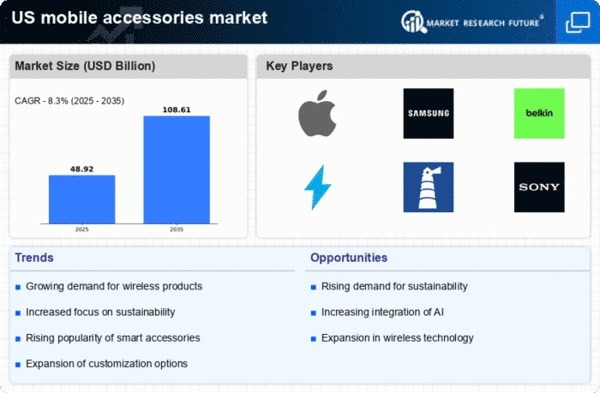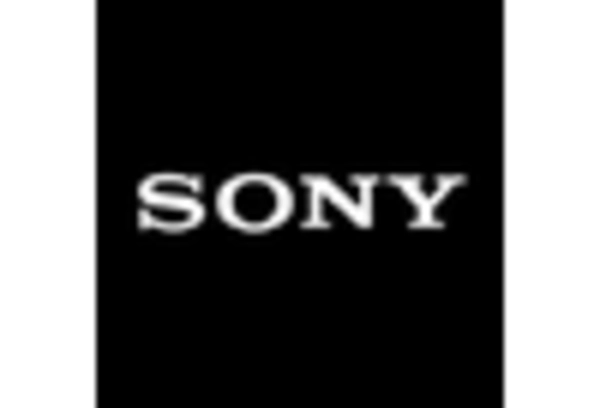The mobile accessories market in the US is characterized by a dynamic competitive landscape, driven by rapid technological advancements and evolving consumer preferences. Key players such as Apple (US), Samsung (KR), and Anker (CN) are at the forefront, each adopting distinct strategies to enhance their market positioning. Apple (US) continues to leverage its strong brand loyalty and ecosystem integration, focusing on premium accessories that complement its devices. Samsung (KR), on the other hand, emphasizes innovation and diversification, expanding its product range to include a variety of accessories that cater to different consumer segments. Anker (CN) is notable for its aggressive pricing strategy and commitment to quality, positioning itself as a leader in the value segment of the market. Collectively, these strategies contribute to a competitive environment that is both fragmented and concentrated, with a few dominant players shaping market trends.
In terms of business tactics, companies are increasingly localizing manufacturing and optimizing supply chains to enhance efficiency and responsiveness to market demands. The competitive structure of the mobile accessories market appears moderately fragmented, with several players vying for market share while a few key companies dominate. This fragmentation allows for innovation and niche offerings, yet the influence of major players like Apple (US) and Samsung (KR) remains substantial, often setting the tone for market trends and consumer expectations.
In October 2025, Apple (US) announced the launch of its new line of eco-friendly accessories, which utilize sustainable materials and packaging. This strategic move not only aligns with growing consumer demand for environmentally responsible products but also reinforces Apple's commitment to sustainability, potentially enhancing its brand image and customer loyalty. The introduction of these products may also serve to differentiate Apple (US) from competitors, as consumers increasingly prioritize sustainability in their purchasing decisions.
In September 2025, Anker (CN) unveiled a partnership with a leading tech retailer to enhance its distribution channels across the US. This collaboration is expected to improve Anker's market penetration and accessibility, allowing the company to reach a broader audience. By strengthening its retail presence, Anker (CN) may capitalize on the growing trend of consumers seeking reliable and affordable mobile accessories, thereby solidifying its position in the market.
In August 2025, Samsung (KR) expanded its accessory lineup with the introduction of smart wearables that integrate seamlessly with its mobile devices. This strategic expansion not only showcases Samsung's commitment to innovation but also reflects a broader trend towards interconnected devices. By enhancing the functionality of its accessories, Samsung (KR) is likely to attract tech-savvy consumers who value integrated ecosystems, thereby reinforcing its competitive edge in the market.
As of November 2025, current trends in the mobile accessories market indicate a strong focus on digitalization, sustainability, and the integration of artificial intelligence (AI) into product offerings. Strategic alliances among companies are increasingly shaping the competitive landscape, fostering innovation and collaboration. Looking ahead, it appears that competitive differentiation will evolve, with a shift from price-based competition to a greater emphasis on innovation, technology, and supply chain reliability. Companies that can effectively navigate these trends are likely to emerge as leaders in the mobile accessories market.
















